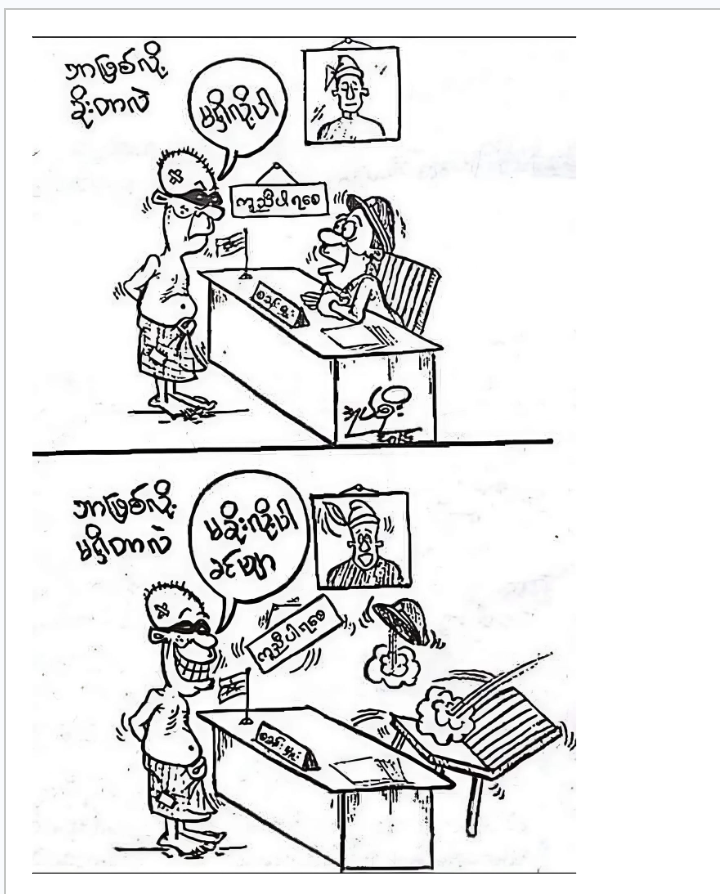Who is the Real Thief?
This scene, illustrated by a Burmese cartoonist, highlights the harsh realities faced by many in Myanmar today. The collapse of societal structures, pervasive corruption, and the brutal crackdown on dissent have left the population struggling for survival. The widespread mistrust of authority is not without reason—security forces have systematically betrayed their mandate, turning against the very people they are supposed to protect, further exacerbating the harsh realities faced by ordinary citizens. A gaunt man stands in front of a stern police officer. The officer sits behind his desk, his face stern and skeptical, tapping his pen against a sheet of paper. He eyes the man, whose clothes are worn and whose face bears the kind of weariness that only comes from years of scraping by. The cartoon reflects the grim struggle faced by ordinary people in post-coup Myanmar, where the complete collapse of governance has plunged the country into severe economic hardship, widespread corruption of officials, and relentless oppression. The lack of basic public services, rampant abuse of power and corruption by officials, and systematic failure of governance have driven countless individuals to desperation. The officer's skepticism and the defiance of the "thief" illustrate the deep divide between those in power and those merely trying to survive. "Why did you steal?" the officer asks. His voice carries an edge, half demanding, half expecting a familiar answer. The man, who has been caught red-handed, scratches his head. He shrugs, as if the question is a bit too obvious, the answer too painfully simple. "I don’t have anything," he replies. The officer, unimpressed, leans forward. "Why don’t you have anything?" There is a pause, and a smile spreads across the man’s face—a smile that holds a touch of irony, a smile that says he has nothing to lose by telling the truth. He looks the officer straight in the eyes and says, "Because I didn’t steal." The police officer blinks. The man is calm, his smile widening as if he’s just pointed out the absurdity of the world in a single phrase. The officer sits back in his chair, his mouth agape, his hat falling off as he tries to process the logic—or perhaps, the bitter truth—of the man’s words. The answer of the "thief" isn't just an excuse; it is a biting critique of the system. It is simple: in much of Myanmar today, those who don’t take what they want, end up with nothing. The thief’s defiant grin isn't the grin of someone proud of their crime; it is the grin of someone who has nothing left to prove. In his own way, he is exposing a cruel truth—that in a world where survival is often determined by what you can grab, the honest end up empty-handed. The police officer, representing a system meant to uphold law and order, sits stunned, momentarily lost for words. He knows that the thief's words cut deep into the heart of the corruption that plagues him and his peers. The officer shifts uneasily, realizing that his own graft and complicity in a broken system have directly contributed to the desperation of the man before him. And as the "thief" stands there, with his worn-out shirt and bare feet, the officer shifts uncomfortably, the room thick with a silence that feels like an accusation. It’s not just any silence, but the kind that accompanies a truth too raw to confront, not spoken in protest or anger, but simply as a matter of fact. It is as if he is saying, “What other choice do I have?” And in that silence, the officer is forced to face the bitter realization of his own corruption—the systemic graft that perpetuates this cycle of poverty and theft. He realizes that his own actions, and those of his peers, have contributed to the desperation driving the man before him. But instead of confronting this truth, the officer— perhaps standing in for Burmese authorities now serving the regime—opts for the easier path, ignoring the harsh reality that, sometimes, survival is an indictment of the very system meant to protect. This cartoon captures the brutal essence of Myanmar's struggle today, where systemic oppression, unchecked corruption of officials, and widespread poverty have left individuals with virtually no options but to defy a system that has abandoned them. The crushing weight of military rule and economic collapse has forced many into impossible situations, where survival itself becomes an act of resistance.

